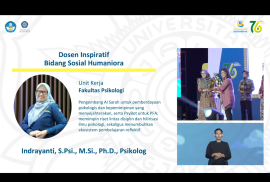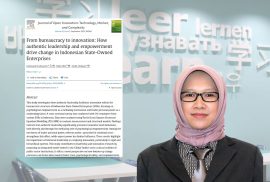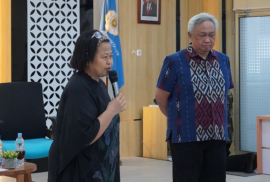Universitas Gadjah Mada has once again conferred the Anugerah Insan Berprestasi (Outstanding Person Award) to members of its academic community and alumni who have demonstrated exceptional contributions and performance to the university and to society at large. This year, the Faculty of Psychology UGM is proud to receive the Inspiring Lecturer in Social Sciences and Humanities award, which is presented to faculty member IIndrayanti, S.Psi., M.Si., Ph.D., Psikolog.
SDG 9: Industry Innovation and Infrastructure
A research team from the UGM Faculty of Psychology will investigate factors that contribute to everyday cognitive failures, ranging from forgetfulness and divided attention to simple errors that can escalate into safety risks, by combining an updated self-report questionnaire with a series of mental chronometry–based cognitive tasks. This initiative places objective, standardized measurement at the core of understanding how different components of cognitive functioning work together and, at times, fail, thereby opening opportunities for more targeted interventions to support psychological well-being and daily performance.
A research team from the Faculty of Psychology, Universitas Gadjah Mada (UGM), is examining how Common Method Bias (CMB) affects findings in survey research. CMB refers to bias that arises when the same measurement approach is used for multiple constructs at the same time, for example, administering many questions to the same respondents, at the same time and place, using the same form. As a result, correlations between concepts can appear higher than they truly are, with part of the “high” value coming from the measurement method rather than the actual phenomenon. Internationally, many journals now require authors to demonstrate efforts to reduce CMB. In Indonesia, however, reporting and mitigation of CMB are still uncommon, highlighting the need for trusted guidance.
The Faculty of Psychology at UGM has launched a study examining how organizational values are translated into effective strategies that enhance company performance. The study stems from the observation that many organizations fail not only due to market pressures, but because shared values are not consistently operationalized in decision-making. “Shared values” here refers to core principles agreed upon and embraced across the organization, from leadership to employees, as a compass for thinking and acting. Examples include integrity, professionalism, innovation, service, and collaboration. Led by Dr. Bagus Riyono, M.A., Psychologist, the research team will test empirical evidence that values must be embedded in strategy to make a tangible impact on performance.
A research team from the UGM Faculty of Psychology will examine how intensive Qur’an memorization training shapes verbal memory and leaves measurable traces in brain structure and connectivity. Grounded in the structured pedagogy of Islamic boarding schools, combining talaqqi, muraja’ah, and consistent repetition, this study positions hafiz as a model of learning that demands high perseverance and repeated information processing. In neuroscience, intensive learning experiences are known to trigger neuroplasticity, the brain’s capacity to adapt both functionally and structurally. However, specific evidence of how these adaptations manifest in hafiz remains limited. This study aims to map brain regions relevant to verbal memory, particularly the hippocampus and caudate nucleus, assess the integrity of white-matter tracts such as the inferior fronto-occipital fasciculus (IFOF) and uncinate fasciculus (UF), and concurrently evaluate behavioral performance in verbal memory. Additionally, this study is the first psychology research in Indonesia on mapping the brains of hafiz using structural brain imaging.
Yogyakarta, October 2, 2025 – An innovation by students from the Faculty of Psychology, Universitas Gadjah Mada (UGM), which initially earned a gold medal at the 36th National Student Scientific Week (PIMNAS), has now achieved a new milestone with its publication in a high-impact international journal. The article titled “PsyBot: A Randomized Controlled Trial of WhatsApp-Based Psychological First Aid to Reduce Loneliness Among 18–22-Year-Old Students in Yogyakarta, Indonesia” was published on July 31, 2025, in SSM – Mental Health (Elsevier), a Scopus Q1-indexed journal with a 2024 CiteScore of 4.2 and an Impact Factor of 2.6.
The Faculty of Psychology at Universitas Gadjah Mada, through its Publication Unit, recently held a capacity-building event titled “Workshop on Manuscript Conversion Strategies for Book Publication” on Friday, July 25, 2025. Conducted online via Zoom Meeting, the workshop was attended by lecturers, researchers, and postgraduate students actively engaged in academic writing within the Faculty of Psychology UGM.
The workshop featured Abdur Rahim, S.S., M.Pd., Head of Cooperation, Manuscript Acquisition, and Senior Editor at Intrans Publishing, as the main speaker and was hosted and moderated by Syahrul Fauzi, S.Pt., M.Pd. This activity was designed as part of the faculty’s ongoing efforts to disseminate scientific knowledge, aiming to ensure that academic papers and research manuscripts do not remain merely as academic documents, but are further developed into scientific books accessible to a broader academic and professional audience.
Yogyakarta, July 2, 2025 — Rigid bureaucratic culture has long been a challenge to fostering innovation in Indonesia’s State-Owned Enterprises (SOEs). A recent study by a team of researchers from Universitas Gadjah Mada (UGM) reveals that authentic leadership and psychological empowerment are critical drivers of innovation within SOEs in Indonesia.
Published in the high-impact international journal Journal of Open Innovation: Technology, Market, and Complexity (Scopus Q1, CiteScore 14.0), the study was authored by Indrayanti, Nida Ulfia, and Taufik Hidayat. The article, titled “From Bureaucracy to Innovation: How Authentic Leadership and Empowerment Drive Change in Indonesian State-Owned Enterprises,” argues that innovation is not just about structure—but about genuine leadership and empowered employees.
The mixed event was attended by 72 participants from various professional backgrounds and institutions, including researchers, doctors, and psychologists from puskesmas, hospitals, clinics, pharmacies, universities, companies, and professional organizations.
Prof. Dra. Kwartarini Wahyu Yuniarti, M.Med.Sc., Ph.D., Psychologist, as Principal Investigator of HGI Studio and workshop moderator, opened the event by providing an overview of the research that has been carried out since 2019. This research is funded by the Productive Innovative Research of the Education Fund Management Institution of the Indonesian Ministry of Finance (RISPRO – LPDP). This research aims to develop measurements of human emotions using psychophysiological equipment such as EEG, HRV, GSR, and body temperature.
The research, which has entered its third year, is also supported by nine research centers from various universities in Indonesia, including North Sumatra University, Gunadarma University, Padjadjaran University, Maranatha University, Diponegoro University, Widya Mandala Christian University in Surabaya, Udayana University, and Ganesha University of Education.
Prof. Kwartarini explained that the rampant phenomenon of gendam and fraud became the basis of her interest in studying hypnosis further. From her findings, the use of hypnosis in therapy resulted in rapid changes for cases such as smoking cessation or specific phobias through memory reconstruction. In her exploration, Prof. Kwartarini met with various experts and realized the need for in-depth understanding so that clinical hypnotherapy can be utilized optimally. Therefore, in this workshop she invited Prof. Ismail to explain the process of memory reconstruction from a physiological perspective.
Prof. Dr. dr. Ismail Setyopranoto, Sp.S (K), is a professor of Neurology from the Department of Neurology, Faculty of Public Health Medicine and Nursing (FKKMK) UGM.
“Our organs other than the brain only receive orders,” explained Prof. Ismail. When the body receives a signal such as pain, there is a process where the signal can be amplified or ignored. This process involves chemicals such as tnf alpha and tnf beta, where tnf beta acts as a protector. With proper regulation, stress, confusion or pain can be minimized.
Furthermore, Prof. Ismail explained about the concept of balance in the body, called the interior milieu. According to him, it is important not to see bacteria as an enemy that must be eliminated immediately, because our bodies need antibodies to fight infection. The same goes for stress, which is important to manage well in children in order to maintain their mental health.
“Don’t assume that a child who learns to walk and then falls is stopped. It is a process of balance between inhibition and excitation,” she explained.
This workshop is expected to provide a deep understanding of the integration between clinical hypnosis and neuroscience and its application in modern psychological practice.
The first part of this workshop can be watched through the Knowledge Channel of the Faculty of Psychology UGM.
Author: Edwin Gandawijaya
Editor: Erna Tri Nofiyana
Photo: Yunissa Meganingtyas









